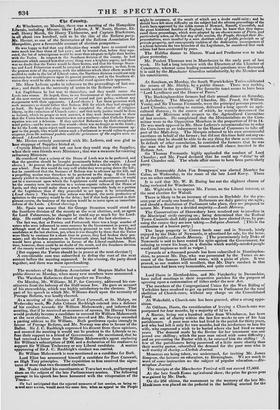ebt Cousttrp.
At Winchester, on Monday, there was a meeting of the Hampshire Liberals, including Messrs. Shaw Lefevre, J. W. Scott, Hector, Et- wall. Henry Marsh, Sir Henry Tichbourne, and Captain Blackstone, in all about two hundred, said to be the elite of the Reform party. Mr. Hector, as one of the Secretaries of the Reform Association for Hampshire, gave a favourable account of election prospects— He was happy to find that any difficulties they would have to contend with were much less than those of last year ; and he trusted that, before they sepa- rated, the list of subscriptions would be more than adequate to fight their battles with the Tories. In respect to the Southern division of the county, he had Iltatementa which assured him that every thing wore a brighter aspect, and there was no doubt that the Tories would be there beaten, and that Sir George Staun - ton and Lord Palmeratun would be returned at the next election ; so that, from She present state of the registry, with the additions which their efforts would be enabled to make to the list of Liberal votes, the Northern division would not only ' maintain but would improve upon its present position ; and in the Southern di- vision they would be able to make a successful stand against their opponents.
Mr. Shaw Lefevre spoke in reference to the proceedings of last ses- sion; and dwelt on the necessity of union in the Reform ranks— Let Englishmen be but true to themselves, and they would coerce the Lords into reason. Ile hoped, then, to see Government at the commencement of the next session introduce measures of sound and just policy, without any compromise with their opponents. (Loud cheers.) Let them persevere with such measures as should follow that Reform Bill for which they had struggled so bard. He hoped that thus would be completed the charter of religious liberty, in the extinction of Church-rates ; and that tardy justice would be dune so Ireland, which its people so welt merited, it they were determined to show that the Union between the countries was not a mockery—that Catholic Eman- cipation was not a delusion. If they satisfied Reformers by their straightfor- ward policy—and he was sure they would—there was no danger as to the result ; for let the Lords again reject such measures, and then let the Government ap- peal to the people, who would return such a Parliament as would refuse to grant sixpence from the national pockets until the grievances of the empire were re- dressed. (Loudcheers.)
Mr. Hector entirely concurred with Mr. Lefevre, and was glad to bear stoppage of Supplies hinted at. • Ceptam Blackstone did not see how they could stop the Supplies, when their own friends were Ministers; that was a measure for coercing refractory Ministers.
He considered that a reform of the House of Lords was to be preferred, and that the question should be brought prominently before the empire. (Loud sheers.) At present the political machine resembled a vehicle with a drag on one wheel. Now this would do very well whilst they were going down the hill; but he considered that the business of Reform was to advance up the hill, and a propelling motion was therefore to be preferred to the drag. If the Lords merely yielded to intimidation, it would not be an equable movement—it would not be a movement upon which the Legislature could uniformly proceed ; but let the country turn its attention to a serious organic reform of the House of Lords, and they would make them a much more respectable body as a portion of the Legislature than if they proceeded to act upon it by intimidation. (Loud cheers.) The longer this reform was delayed, the more productive of agitation to the country would be the delay ; but if that body persisted in their present course, the business of the nation would be to insist upon an immediate reform of the Lords. ( Great cheering.) Mr. Spain was aware that Sir George Staunton would stand for the Southern division of the county at the next election, and, as agent for Lord Palmerston, be thought be could say as much for his Lord- ship. He could explain the cause of the loss of the last election— The fact was, that at Portsea and Portsmouth there was a large number of voters who were influenced in some measume by the Government In power, and although most of those had conscientiously promised to vote for the Liberal candidates at the last election, yet, when it was thought by them that the Tories were likely to continue for a short time in power, they had broken their pro- mises ; and the broken promises in Portsmouth alone, had they been fulfilled, would have given a termination in favour of the Liberal candidates. Next time, however, there could be no doubt of the result, and the Southern division of the county would no longer continue misrepresented.
[But suppose the Tories should be in power at the next election?] A considerable sum was subscribed to defray the cost of the next contest before the meeting separated. In the evening, the party dined together, and there was more speechmaking.


























 Previous page
Previous page